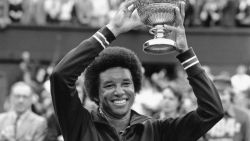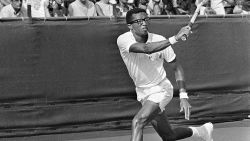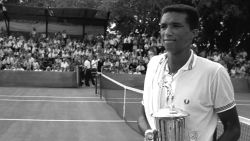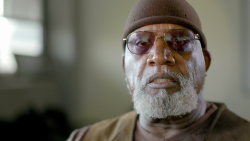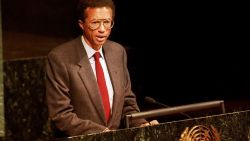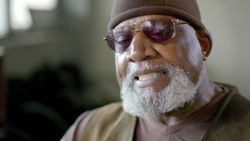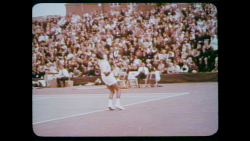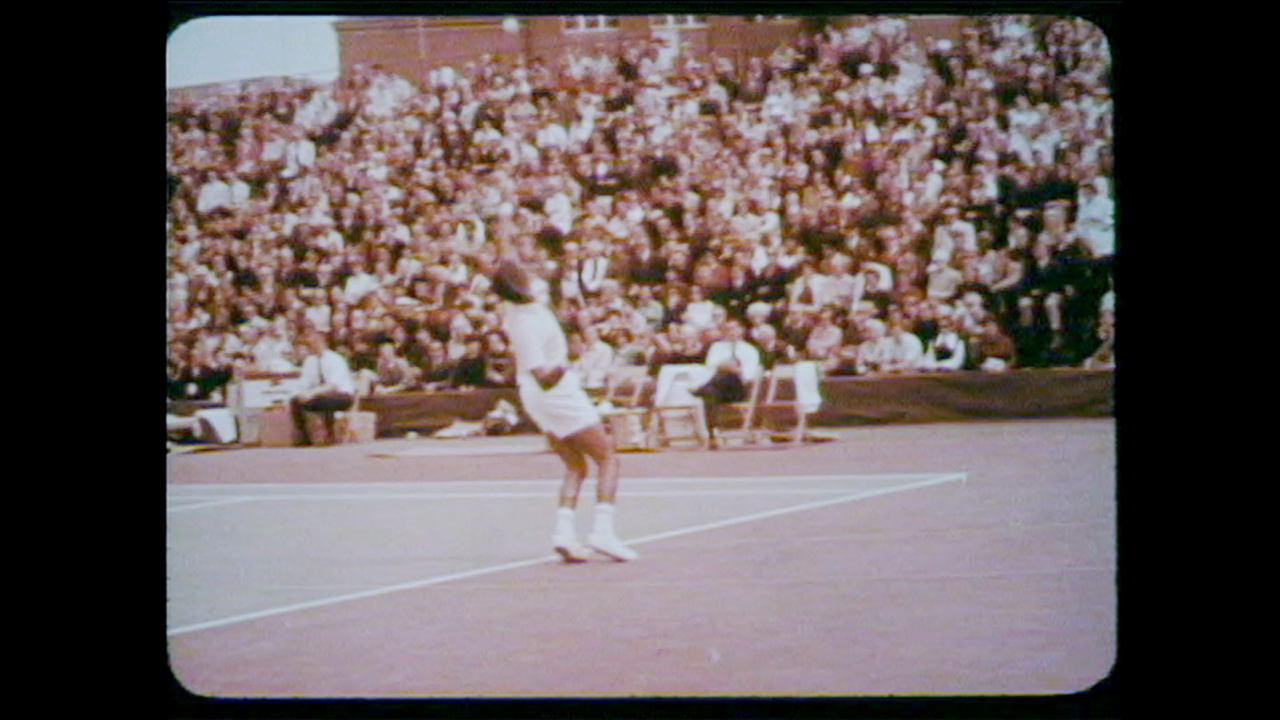The CNN Film “Citizen Ashe” explores the enduring legacy of tennis great and humanitarian Arthur Ashe, tracing his personal evolution from sports legend to global activist. His own words, and those closest to him, reveal his quiet determination to “use what he had to do what he could.”
INTRODUCTION
Directors Rex Miller and Sam Pollard explore the enduring legacy of tennis great and humanitarian Ashe in a feature documentary as elegant, meaningful, and poignant as the life he lived.
Ashe’s widow, brother, friends from his childhood in Richmond to his Grand Slam tournament playing and coaching days, as well as confidantes that nurtured his personal evolution from sports legend to global activist, describe the key events that shaped Ashe’s quiet determination to ‘use what he had to do what he could.’ We see Ashe as a young, college student excelling at UCLA, as well as his military career at West Point. The film also details his visit to South Africa as an anti-apartheid activist accompanied by Ambassador Andrew Young, where Ashe spent most of his time in Soweto with young, Black, South Africans.
HOW TO USE THIS GUIDE
This guide is designed to help you navigate conversations about your thoughts, emotions, questions, and reactions to the film. It contains information about the film, resources for further learning, and discussion questions to deepen your understanding of the legacy of Ashe and his continued impact, along with the change-makers who are making a difference in the world today. We encourage you to utilize this guide to deepen your own engagement and impact, and examine how you too, can make a positive difference where you are.
TIMELINE
ARTHUR ASHE - A HUMANITARIAN AND TENNIS TIMELINE (1943-1993)
- July 10, 1943 – Arthur Robert Ashe, Jr, is born in Richmond, VA.
- 1963 – Ashe wins the National Junior Indoor Tennis title.
- 1968 – U.S. Open men” singles win.
- 1969 – Ashe turns pro.
- 1970 – Australian Open men’s singles win.
- 1971 – French Open men’s doubles win.
- 1975 – Wimbledon men’s singles win (Ashe compares the reaction to his win by African Americans to Joe Louis winning the heavyweight championship); Billie Jean King wins women’s singles.
- October 1976 – Ashe meets photographer Jeanne Moutoussamy-Ashe at a UNCF tennis tournament.
- February 20, 1977 – Ashe marries Moutoussamy-Ashe in a ceremony performed by Ambassador Andrew Young.
- 1977 – Australian Open men’s doubles win.
- 1979 – Ashe suffers from a heart attack, and is rushed to the New York Hospital for open heart bypass surgery at 36 years old.
- March 1980 – Ashe retires from tennis as a professional player.
- 1983 – Ashe contracts HIV from an unscreened blood transfusion during open-heart surgery.
- 1985 – Ashe retires from tennis and is inducted into the International Tennis Hall of Fame.
- December 1986 - Ashe and Moutoussamy-Ashe welcome a daughter, whom they named Camera, after ‘s profession.
- 1988 – Labor Day Weekend, Ashe is operated on for toxoplasmosis and learns he has AIDS.
- November 14, 1988 – All 3 Volumes of Ashe’s 5-year project are published: A Hard Road to Glory: A History of the African-American Athlete.
- April 8, 1992 – Ashe acknowledges his AIDS diagnosis in a public press conference after being confronted by a USA TODAY journalist.
- 1992 – Ashe founds the Arthur Ashe Institute for Urban Health.
- 1993 – Ashe finishes writing Days of Grace: A Memoir, with Arnold Rampersad, days before his death (published in 1994).
- February 6, 1993 – Ashe dies from AIDS-related pneumonia, 3 days after admission to hospital.
- June 20, 1993 – Ashe is posthumously awarded the Presidential Medal of Freedom by Bill Clinton (accepted by Moutoussamy-Ashe).
DISCUSSION QUESTIONS
ATHLETICS AND INSPIRATION

- Ashe said he wanted to be the Jackie Robinson of tennis. Now, many young athletes aspire to be the “Arthur Ashe of _____.” What sport or sector would you like to bring further equality to? How have you excelled and surprised those who have underestimated you?
- Dr. Robert Johnson, known to some as the “godfather” of Black tennis, was shown to be an impactful mentor and leader for Ashe during his childhood, spending decades training and mentoring Black Athletes in Virginia. Dr. Johnson was pivotal to Ashe’s life and professional development. Have you ever encountered a “Dr. Johnson,” who supported or uplifted you? What was their impact?
- The film asks, “Arthur Ashe chose to speak. What did you do?” Discuss your individual answers to this question - have you spoken about issues you care about or want to? What are they and how will you/are you going about it?
- Do you think activism has a place in athletics/sports? Is it becoming more or less welcome?
- Name some athletes who are activists and successful in their efforts to champion the causes they are passionate about.
- What does being an athlete from your particular community mean to you?
- Naomi Osaka and LeBron James are known for championing social justice causes and raising mental health awareness. Muhammad Ali was recognized as the “Champion of Freedom” for his unrelenting, persistent fight for equality, peace, and justice in every area of life all over the world. Do the social issues of today galvanize your spirit to perform in your sport and or contribute to enacting positive social change within your community?
- Observing the outward activism of Colin Kaepernick and its subsequent impact on his career, what does change/representation in the business of athletics/sports mean to you?
RACIAL INJUSTICE

- Ashe discusses the conflict of wanting to speak out about racial justice but being aware that it could hurt his career and discredit his family name. Donald Dell, Ashe’s agent and friend, mentions balancing “tremendous respect for authority” with wanting to speak out when it’s needed. Discuss a situation where: You felt conflicted about speaking out for yourself or for others. What did you end up doing? You saw someone else speak out and face the consequences. How and why did they inspire you?
- Civil rights activist Harry Edwards says in the film, “Arthur was the first person to really push me to understand that Black orthodoxy is not an acceptable substitute for institutionalized white racism, that it has to be about people having the freedom to make their own decisions about how they approach the struggle. Otherwise what are they fighting for?”
- Edwards discusses how the responsibility to drive change often falls on the shoulders of those who are directly impacted by the issue. Do you think the cultural conversation has shifted since Ashe was grappling with his own activism? Do you think the current conversation is focused more on institutionalized white racism, or on the need for impacted communities to drive action?
- Carole Dell, a close friend of the Ashes and Donald’s spouse, describes Arthur Ashe in his early years as “not gender sensitive at all,” yet the film follows him throughout his career and activism as he changes to become more aware of women’s rights and gender equity, motivated by his wife, Jeanne Moutoussamy-Ashe. Have you experienced a similar journey of gaining a deeper understanding about a certain issue that ultimately changed your opinion? Can you think of any athletes, celebrities, etc. who publicly appear to have had similar self-reflective experiences?
HEALTH EQUITY / AIDS

- The film examines Ashe’s desire to keep his HIV & AIDS diagnoses private, but being forced to announce it publicly despite his wishes. How do you think that the stigma of HIV/AIDS diagnoses have changed over time, if at all? In what ways can athletes specifically band together to dissolve the stigma of HIV/AIDS and or improve health equity?
- Given the physical demands of athletics and the ever-growing field of sports medicine, what changes do you hope to see in the world of sports medicine and athletics regarding the stigma of HIV/AIDS?
ACTIONS & ACTIVITIES
After your discussion, we encourage you to discuss your own community’s connection to the events of the film and subsequent ongoing events.
SHARE YOUR STORY
- Get involved with Global Tennis Network, an online tennis network providing access to domestic and international communities, where you can share your own story, add to the conversation, and build a network.
- Arthur Ashe, champion tennis player and activist, inspired many as the first Black man to win the US Open, Australian Open, and Wimbledon. Which athlete has inspired you the most? Share your response on social and tag the athlete. Please use #CitizenAshe.
CELEBRATE
- Honor the life and legacy of Arthur Ashe by organizing community volunteer opportunities that help to revitalize and reimagine local community spaces. Visit VolunteerMatch to find volunteer opportunities in your community.
- Nominate someone special in your community to be a CNN Hero.
- Take an interactive virtual tour of the National Center for Civil and Human Rights, a museum and cultural institution that connects the US Civil Rights Movement to human rights challenges today.
ACT
- CNN’s Impact Your World informs audiences on ways to take action on many global issues, like fighting racism or supporting mental health awareness. You can also see how people around the world are making an impact. Visit the website or join the conversation on Twitter @CNNImpact.
- The Coaching Corps’ Race Equity Initiative is increasing community involvement and sport participation nationally among Black and brown adults with a focus on parents and community members, so their kids can reap the benefits of playing sports. Learn about how you can support the initiative and sign up to be a coach in your community.
- Check out what local opportunities are available through USTA and become involved with active communities to enact positive social change.
- Apply to Good Sports to get equipment donations for your sports teams!
- The Jackie Robinson Foundation’s JRF Scholars receive college scholarships of up to $30,000 and are financially sponsored to attend JRF’s annual, four-day “Mentoring and Leadership Conference” in New York City and other events throughout the year. Aside from generous financial support, Scholars benefit from a comprehensive, four-year program that includes career guidance, internship and permanent job placement, travel abroad, and leadership and practical life skills training. Apply here.
- Want to find a great mentor? Find a mentoring opportunity here, or you can apply to be a mentor too!
LEARN MORE
- Learn more about Arthur Ashe’s legacy at the Arthur Ashe Institute for Urban Health.
- Athlete Ally works to end the structural and systemic oppression that isolates, excludes, and LGBTQI+ people in sports. Visit their Athletic Equality Index, which assesses inclusion policies and practices in NCAA Division-I athletic departments, to find your college or university and then take action by spreading the word about why inclusive policies and practices matter.
- The Racial and Gender Report Card is the definitive assessment of hiring practices of women and people of color in most of the leading professional and amateur sports and sporting organizations in the United States.
- Not all youth are born with privilege, opportunities, or a positive network. Some are raised throughout their lives thinking they’ll never be able to live the life they’ll want. This is because of the environment and the people who they surround themselves with every single day. Every Black person should have the ability to create the life they’ve always wanted and that’s what The 100 Black Men of America, Inc. provides.
- The National Urban League is a historic civil rights organization dedicated to economic empowerment, equality, and social justice.
- The Equal Justice Initiative is committed to ending mass incarceration and excessive punishment in the United States, to challenging racial and economic injustice, and to protecting basic human rights for the most vulnerable people in American society. Read more about their work in racial justice.
- In 1969, the National Junior Tennis League (NJTL) was created as a way to gain and hold the attention of young people, with the hope of teaching them the importance of character, getting an education and becoming productive citizens. Looking to enroll to become an NJTL chapter for the first time or have questions about becoming an NJTL chapter? Click here to learn more.



